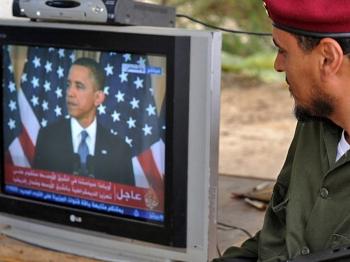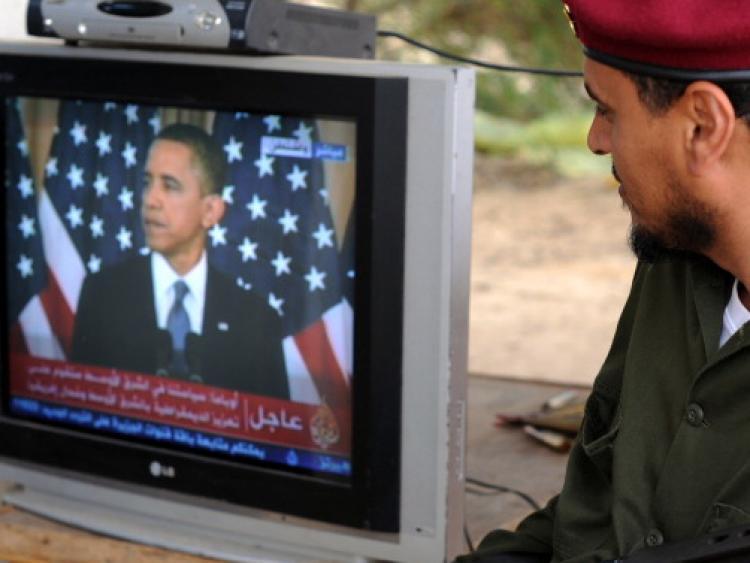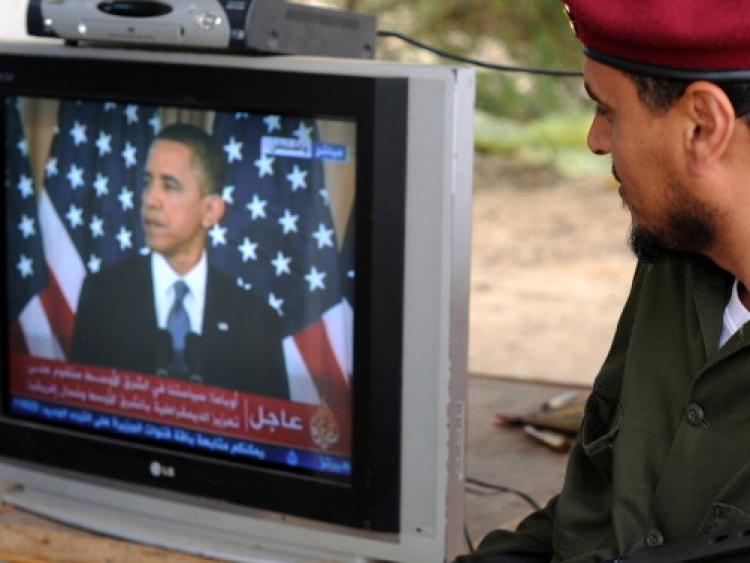“The question before us is what role America will play as this story unfolds,” Obama said in a live video broadcast from Washington, designed to broadcast during prime time in the Middle East and North Africa.
Obama announced a new policy where the United States will support rebels seeking to overthrow repressive regimes, and will offer an economic olive branch to help move them into a stable future—even if their interests do not specifically align with those of the United States.
For decades, U.S. policy in the region was more security oriented. Obama stated that while the United States will maintain this, “we must acknowledge that a strategy based solely upon the narrow pursuit of these interests will not fill an empty stomach or allow someone to speak their mind.”
In the new approach, the United States will support the revolutions sweeping through the Arab world, knowing, “Not every country will follow our particular form of representative democracy, and there will be times when our short-term interests don’t align perfectly with our long-term vision for the region,” Obama said.
Doing otherwise, according to Obama, “will only feed the suspicion that has festered for years that the United States pursues our interests at their expense. ... A failure to change our approach threatens a deepening spiral of division between the United States and the Arab world.”
For the Arab world, the significance of this could run deep. “This is a big deviation in our policy,” said Max Abrahms, a postdoctoral fellow of the Dickey Center for International Understanding at Dartmouth College, by phone.
Historically, opinion polls from countries in the Arab world have revealed views that depart wildly from U.S. interests—ranging from opinion on the use of violence against civilians, to Israel-Palestinian tensions.
Public opinion from the region sent a message to the United States, “If we empower the people, we would likely end up with leaders that support policies that are much more hostile than the status quo,” Abrahms said.
There was fear of elected leaders representing hostile policies and extremism. Hamas, for example, is the publicly elected party of Palestinians—and it has engaged in terrorist activities.
Thus, the United States has often supported leaders viewed as the best of the worst—individuals who may not stand for freedom or their people, but whose international policies were less extreme.
“It’s for that reason that the United States has been a strong ally of people like Mubarak in Egypt,” Abrahms said.
The difference in policy, however, where the United States stood for freedom yet gave financial and military support to undemocratic leaders, created a stigma in the region that America was only acting on its own interests.
The new policy, voiced by Obama in his May 19 speech, aims to change this.
“Today I want to make it clear that it is a top priority that must be translated into concrete actions, and supported by all of the diplomatic, economic, and strategic tools at our disposal,” Obama said.
The Arab Spring
What sparked the policy change is the fundamental shift shown in the Arab Spring—a choice of nonviolence and a call for democracy and freedom.
Before describing the new policy, Obama referenced the death of al-Qaeda leader Osama bin Laden and its significance for the Arab world.
“He was a mass murderer who offered a message of hate—an insistence that Muslims had to take up arms against the West. ... His agenda focused on what he could destroy—not what he could build,” Obama said.
Bin Laden’s death, likewise, came amid a shift in the region; a time when public opinion of al-Qaeda was falling, and after revolutions in Tunisia and Egypt showed that change could be made without the use of violence.
“By the time we found bin Laden, al-Qaeda’s agenda had come to be seen by the vast majority of the region as a dead end, and the people of the Middle East and North Africa had taken their future into their own hands,” Obama said.
Bin Laden’s death was more than just the killing of a terrorist leader. It signified the end of violence as a means for change, and a move into restraint and peaceful protest to bring about change.
“Al-Qaeda’s political views have totally fallen out of favor,” Abrahms said.
Meanwhile, another shift took place. “I think that on at least a rhetorical level, what Obama says the Middle East wants, and what the vast majority of Arabs claim they want, there is probably more of a convergence than at any time we’ve ever seen,” Abrahms said.




![[LIVE Q&A 04/24 at 10:30AM ET] Media Raise Questions About Controversial Cloud Seeding After Middle East Floods](/_next/image?url=https%3A%2F%2Fimg.theepochtimes.com%2Fassets%2Fuploads%2F2024%2F04%2F23%2Fid5635847-CR-TN_REC_0424-1080x720.jpg&w=1200&q=75)


![[LIVE 4/26 at 10:30AM ET] New Push Started for Global Digital Currencies](/_next/image?url=https%3A%2F%2Fimg.theepochtimes.com%2Fassets%2Fuploads%2F2024%2F04%2F19%2Fid5633115-0426-1080x720.jpg&w=1200&q=75)
Friends Read Free